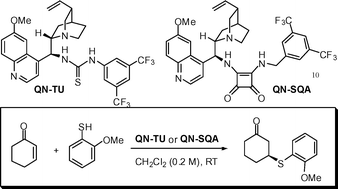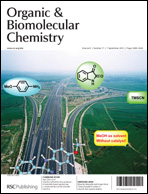In this report, we demonstrate that self-aggregation is an intrinsic problem of bifunctional organocatalysts, especially in the case when the substrates do not have functional groups which are able to bind strongly with catalyst. Due to their self-association phenomena, the enantioselectivity of bifunctional catalysts dramatically decreases with increasing catalyst concentration or decreasing temperature. Thus, when the substrate concentration is kept constant, the enantioselectivity of bifunctional catalysts dramatically increases with decreasing catalyst loading. The ee values obtained at different catalyst concentrations are fairly consistent with the diffusion coefficients (D) of the catalysts, strongly indicating that their degree of self-association plays a crucial role in determining their enantioselectivity.
You have access to this article
 Please wait while we load your content...
Something went wrong. Try again?
Please wait while we load your content...
Something went wrong. Try again?


 Please wait while we load your content...
Please wait while we load your content...